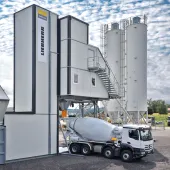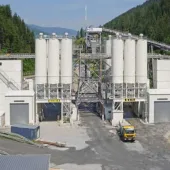New BHS mixer for Grand Paris Express

Unibéton replace planetary mixer with 4.5 cubic metre capacity twin-shaft mixer from BHS-Sonthofen
UNIBÉTON, a French subsidiary of the HeidelbergCement Group, are producing specific ready-mixed concretes for the ‘Grand Paris Express’ project. To optimize the production process, in 2017 the company replaced a planetary mixer with a twin-shaft mixer from BHS-Sonthofen. For the first time in France, the new mixer was installed with frequency converters to enhance operations.
Grand Paris Express is said to be the largest public transportation and infrastructure project in Europe, comprising four new transit lines and the extension of a further three existing lines. In Issy-les-Moulineaux, a suburban area of Paris, Unibéton are using new concrete recipes that require longer mixing times.
In order to ensure reliable and homogenous mixtures from batch to batch, the Unibéton management team decided to replace one of their planetary mixers with a more powerful DKXS 4.50 twin-shaft batch mixer from BHS-Sonthofen.
‘The civil works companies in the Grand Paris Express project work with concrete recipes that feature a lot of binders, additives and plasticizers. Our technology delivers highly dynamic movement during the mixing processes and is a perfect long-term solution for these new concrete recipes,’ said Alexandre Bernabé, technical engineer for the French market at BHS-Sonthofen.
The German company invented the twin-shaft mixer more than 130 years ago and has continuously developed the technology. Unlike other mixing systems with circular motion, the twin-shaft batch mixer offers a three-dimensional mixing concept that results in an intensive exchange of materials. This happens in the turbulent overlap area of the two mixing circles.
In this way, the twin-shaft batch mixer rapidly produces mixtures with consistently high levels of homogeneity. In the case of ready-mixed concrete, cements and admixtures are said to undergo optimal integration and are rapidly and evenly distributed throughout the entire mixture. The three-dimensional mixing concept also leads to shorter mixing cycles with reduced energy consumption.
‘With this mixing line we are producing close to 750 cubic metres of concrete per day and around 15,000 cubic metres per month,’ said Stéphane Haffreingue, who is responsible for the operations in the Paris area, including Unibéton’s Issy-les-Moulineaux site. ‘Since the twin-shaft batch mixer was installed, we have considerably boosted our quality.’
The twin-shaft batch mixer features a drive comprising two 80kW motors that, for the first time in France, are coupled with frequency converters. These converters have a key role in processing the specific concrete recipes.
‘When you work with additives and plasticizers, air bubbles will form in the mixing process. To prevent these air bubbles, we use the frequency converters,’ explained Alexandre Bernabé. ‘Made by Danfoss, the frequency converters are designed to control speed. They slow down the rotation speed at the end of each mixing cycle. As a result, the air is less likely to become trapped in the concrete and exits at the surface of the mix.
BHS-Sonthofen, who delivered the mixer in August 2017, co-operated with renowned French industrial boiler specialists Taillefer to get the new mixer up and running as quickly as possible. The company took care of the entire replacement process from disassembly of the old machine and the assembly of the new mixer, to installing new steel structures and platforms. Taillefer also supplied the special discharge cone of the mixer, which was designed by BHS.
‘With two parallel production lines, the replacement was quite a challenge. But thanks to close co-operation with Unibéton and suppliers like Taillefer, we were fully on schedule,’ concluded Mr Bernabé.









